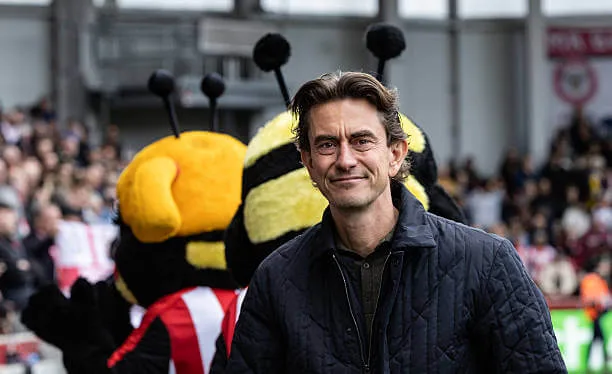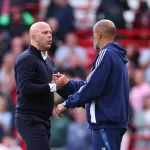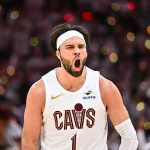For the first time since 2018, Brentford find themselves at a crossroads. Thomas Frank’s move to Tottenham marks the end of a defining chapter, not just for a manager, but for a footballing identity meticulously built over six seasons. Under Frank, Brentford didn’t merely survive in the Premier League, they redefined what sustainability and smart thinking could look like at the top level.
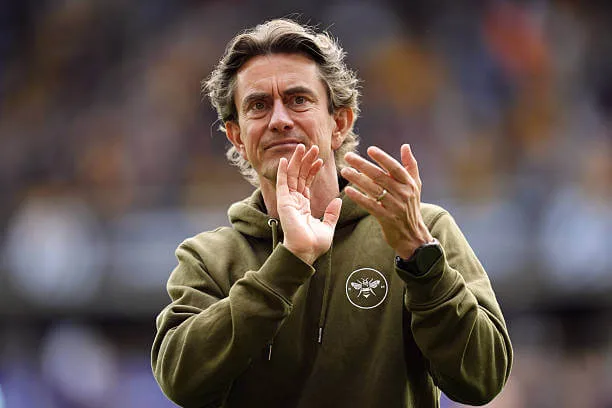
His legacy is measured not only in results, but in systems and structure, a club built on tactical flexibility, data-led recruitment, and collective cohesion. Brentford punched above their weight because they understood who they were, and who they were not.
Now, the challenge is to preserve that foundation without standing still. This isn’t a rebuild. It’s a continuation, with evolution in mind. The next coach must match ambition with alignment, someone capable of respecting the blueprint while writing the next chapter.
So who fits the brief?
Thomas Frank’s Brentford: A Tactical Evolution, Not Just a Success Story
Thomas Frank didn’t just steer Brentford into the Premier League, he redefined what survival, and then success, could look like for a club of their size. Appointed in 2018, Frank guided the Bees from promotion hopefuls to a stable top-flight force, all while imprinting a tactical identity that evolved with the club.
Frank’s defining trait? Flexibility. Early Premier League campaigns were shaped by pragmatism: a 3-5-2 or 5-3-2 formation, compact mid-blocks, and lethal transitions. Brentford didn’t dominate the ball, but they controlled space, exploited set pieces, and leaned on Ivan Toney’s intelligence up top. Calling them “defensive” misses the point, they were disruptive, deliberate, and disciplined.
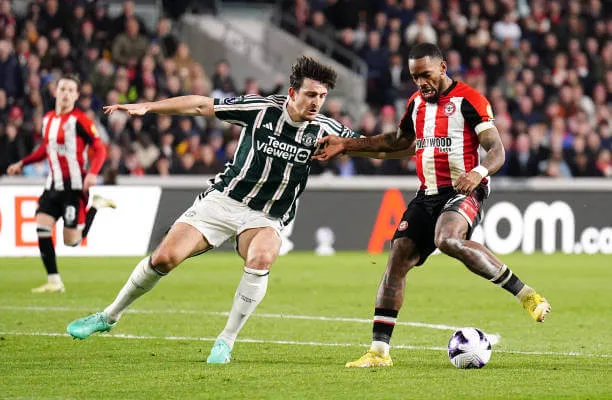
By 2023, a shift emerged. “Brentford 2.0” aimed for greater control without sacrificing resilience. Injuries slowed progress, but the tactical ambition was clear. Formations became more fluid, from 4-2-3-1 and 4-3-3 out of possession to 4-2-2-2 in build-up. Technical profiles like Damsgaard and Wissa thrived in central pockets; wide players like Schade and Lewis-Potter offered verticality and rotations.
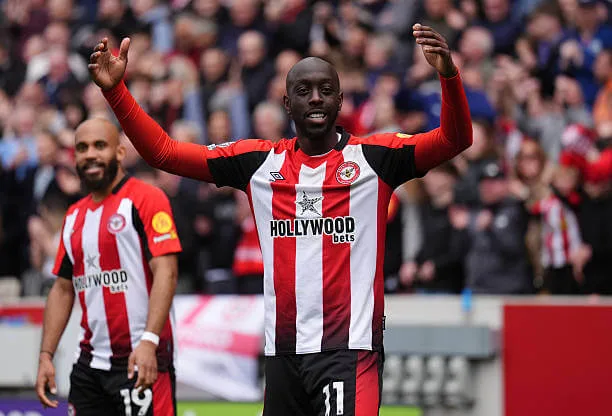
The metrics underscored the evolution:
– 0.13 xG per non-penalty shot — best in the league (2024/25)
– 14.5m average shot distance — shortest in the division (2024/25)
– Doubling of quick build-up sequences since 2021
Even as the attacking structure evolved, Brentford’s defensive core held firm. They remained among the best pressing sides, with 190 final-third recoveries, and boasted the league’s best set-piece defence (just 1.0 goal conceded per 100 set plays) in the just ended league campaign. Frank’s Brentford wasn’t a system, it was a living, learning mechanism. The onus now is finding someone who understands how to build with Brentford, not over it.
What Kind of Coach Should Brentford Look For?
Replacing Thomas Frank isn’t about replicating his ideas, it’s about continuing his principles. Brentford’s next coach doesn’t need a manifesto, they need a playbook built on adaptability, clarity, and player development.
Frank’s greatest strength was his tactical flexibility. He adjusted Brentford’s style as they rose through the leagues, moving from vertical and compact to controlled and possession-oriented, depending on the moment. That evolution must continue. The next manager should view tactics as a toolkit, not a belief system, capable of shifting shape, tempo, and approach based on opposition and context.
Brentford’s model is rooted in coaching undervalued talent into Premier League performers. From Toney to Pinnock to Mbeumo, internal growth powered their rise. The next head coach must align with a data-driven recruitment strategy and be a hands-on developer of players. At Brentford, progress isn’t purchased, it’s built.

This isn’t a team defined by pressing or possession alone. Brentford’s success has come from reading the game’s rhythm, when to sit, when to squeeze, when to break, and when to build. Their next coach must be fluent across all phases. Ultimately, Brentford’s next manager will inherit a stable platform, a clear identity, and a club that knows what it is. The real challenge? Taking what works, and finding the next gear.
Who Could Replace Him?
With Thomas Frank gone, Brentford must evolve without losing their identity, data-driven, development-focused, tactically smart. The next coach must balance continuity with innovation. The question is: Who can?
Francesco Farioli
Francesco Farioli isn’t your typical managerial candidate, and that might make him Brentford’s most fascinating. Just 36, the Italian has carved out a reputation as one of Europe’s most forward-thinking young coaches, despite lacking a professional playing background. With a degree in philosophy, a grounding in sports science, and a tactical education under Roberto De Zerbi, Farioli is a meticulous, cerebral figure who constructs teams with precision and ambition.
His 2024–25 campaign at Ajax was both a showcase of his upside and a reminder of his volatility. Taking over a fractured side mid-season, he reignited Ajax’s identity through structured possession, coordinated pressing, and dynamic positional play. They led the Eredivisie for much of the run-in before collapsing late, ultimately missing out on the title but securing Champions League qualification. Farioli departed soon after, citing a misalignment in long-term vision, underlining his uncompromising commitment to principle.
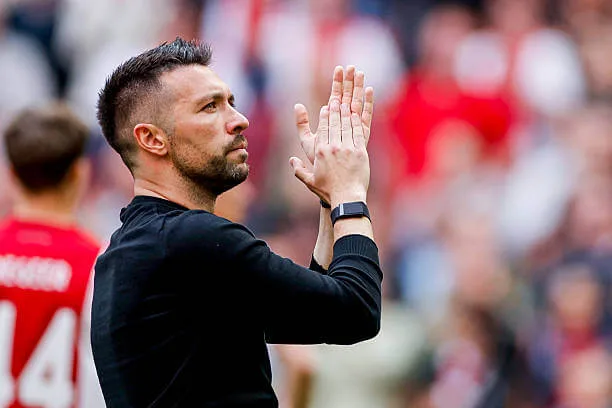
Tactically, Farioli is high-concept yet increasingly proven. He favours 3-2 and 2-3-2 build-up structures, inverts full-backs into central zones, and involves the goalkeeper as a key outfield distributor. Yet, his time at Nice in 2023–24, where he built Ligue 1’s best defence with 17 clean sheets, proved he can also deliver control through solidity.
For Brentford, he offers both alignment and audacity. His detail-driven, development-focused model fits a club rooted in data, structure, and youth progression. His work with young players, including multiple teenage starters at Ajax, would support Brentford’s long-term project.
But he also demands adaptation. Farioli’s football isn’t plug-and-play, it requires tailored recruitment and deep buy-in. His stints have been short, his methods intense, and his conviction unwavering. For a club that has thrived on stability, that’s a leap. Still, if Brentford see Frank’s exit as a chance to pivot, from counter-attacking efficiency to positional dominance, Farioli may be the boldest option on the table. He won’t offer familiarity, but he might offer the future.
Kjetil Knutsen
Kjetil Knutsen is not a name built for headlines, but he may be tailor-made for Brentford. At 56, the Norwegian coach has quietly built one of Europe’s most coherent, overachieving teams in Bodø/Glimt, combining tactical clarity and sustained success on a modest budget. In that sense, he doesn’t just align with Brentford’s philosophy, he embodies it.
Since taking charge in 2018, Knutsen has led Glimt to four Eliteserien titles in five years, recording a remarkable 64.8% win rate and averaging two points per game. His 2020 side set a Norwegian top-flight record with 102 goals in a single campaign, an attacking high-water mark rooted not in individual brilliance, but in systemic excellence.
His preferred 4-3-3 is structured yet flexible, built on principles that resonate deeply with Brentford’s own tactical DNA. Glimt use inverted full-backs, back-three build-up patterns, and an aggressive high press, blending 61–63% possession with relentless verticality. It’s high-intensity, choreographed football, direct without being frantic, dominant without being rigid.
What makes Knutsen particularly valuable for a club like Brentford is how his model holds under strain. Glimt have sold star after star, Hauge, Evjen, Bjørkan, Berg, and yet the system has endured. That ability to absorb turnover while remaining tactically fluent speaks to his elite coaching and developmental acumen. It’s also critical for a club that operates within a sell-to-reinvest model.
His European résumé adds weight. A 6–1 dismantling of Mourinho’s Roma in 2022 raised eyebrows, but Glimt’s run to the Europa League semi-finals in 2025, knocking out Lazio before losing to Tottenham, confirmed his model can scale beyond Norway.
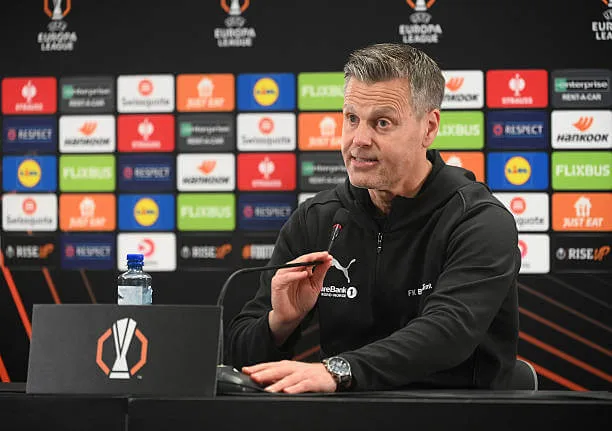
The one knock? He hasn’t coached in a top-five league. But neither had Thomas Frank or Graham Potter when they made their Premier League breakthroughs. Brentford have never chased names, they’ve backed ideas. Knutsen fits that mould, a systems coach, a culture-builder, a leader whose methods drive results. With his contract expiring in late 2025, this could be the perfect window. For Brentford, Knutsen offers continuity, clarity, and the chance to evolve without losing sight of who they are
Kieran McKenna
Kieran McKenna’s rise through football’s coaching ranks has been anything but accidental. Still only 39, the Northern Irishman represents the prototype of the modern manager: tactically astute, development-led, and steeped in data-driven methodology. His background, forged in elite environments at Tottenham and Manchester United, where he worked under José Mourinho and Ole Gunnar Solskjær, laid the foundation. But it’s what he built at Ipswich Town that truly sets him apart.
Appointed in December 2021, McKenna inherited a League One side mired in mid-table drift. Two and a half seasons later, Ipswich were back in the Premier League, a journey powered not by big spending or momentum, but by process. Across two promotion campaigns, his teams amassed 194 points and 193 goals, playing some of the most structured, progressive football seen in the EFL era.
McKenna’s tactical approach is precise yet flexible. While nominally favouring a 4-2-3-1, his Ipswich teams routinely morphed into 3-4-2-1 or 4-4-2 shapes depending on phase of play. Their attacking structure emphasised third-man runs, rotations in wide areas, and carefully choreographed sequences, all underpinned by relentless detail. His sides dominated through control, with full-backs like Leif Davis (18 assists in a single campaign) and goalkeepers chosen specifically for their distribution.
Yet for all his methodology, McKenna is no ideologue. In the Premier League, where Ipswich finished 19th in 2024–25, he adjusted. He adopted deeper blocks when required and incorporated more direct vertical play. Despite only four wins and 82 goals conceded, his team never abandoned their principles. Instead, they earned admiration for sticking to their identity, even in adversity.
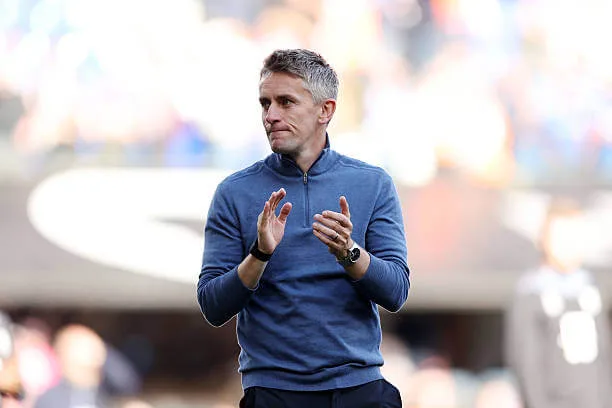
McKenna’s loyalty has also been notable. Turning down top-flight overtures last summer, he signed a new four-year deal with Ipswich, reaffirming his commitment to the project. But that hasn’t cooled external interest, and with Brentford now searching for their Thomas Frank successor, McKenna looms as an ideal fit. The parallels with Frank are striking: a background in youth development, an emphasis on structure and culture, and a calm, analytical temperament. But McKenna arguably offers even sharper tactical precision and an even deeper alignment with Brentford’s analytics-heavy approach. He fits the Brentford model, and might elevate it.
Keith Andrews
Keith Andrews isn’t the flashiest name in Brentford’s coaching search, but he may be the most Brentford name of all. Quietly influential and deeply embedded in the club’s internal structure, Andrews has emerged as a serious candidate to succeed Thomas Frank, particularly if the club opts for continuity over external overhaul.
A former Republic of Ireland international with more than 400 senior appearances, Andrews has blended a player’s intuition with a coach’s analytical discipline. Since earning his UEFA Pro Licence, he’s built a diverse CV, including coaching roles with the Irish national team and Sheffield United, before joining Brentford’s first-team setup, where his influence has grown steadily.
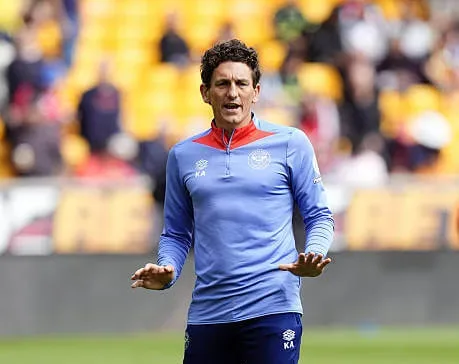
His primary contribution? Set-piece mastery. Under Andrews’ guidance, Brentford became one of the Premier League’s most efficient dead-ball teams in 2024–25, scoring 13 set-piece goals from an xG of 16.71, a top-three return in the division. But this isn’t just about routines on the training pitch. It speaks to detailed planning, video analysis, and an understanding of how marginal gains can tip tight matches, all hallmarks of Brentford’s data-led approach.
The precedent exists. Thomas Frank himself was promoted from within after serving as an assistant. Andrews could follow a similar path, offering minimal disruption during a summer that may already bring squad turnover. His appointment would preserve tactical consistency and maintain Brentford’s identity, especially important for a club that builds long-term rather than resets.
But the gap is clear: Andrews has never managed a senior team. While he’s respected for his tactical acumen and communication, stepping into the lead role in the Premier League is a significant leap. Managing media, in-game pressure, and broader squad dynamics as the final decision-maker presents a new level of challenge.
For Brentford, it would require a robust support structure, perhaps pairing him with an experienced assistant, to navigate that transition. It’s a risk, but one aligned with the club’s ethos: low-cost, high-upside, and rooted in belief in development, not just of players, but of staff too.
Let’s be clear: replacing Thomas Frank is not about filling a vacancy, it’s about honouring a legacy without freezing it in time. Frank didn’t just keep Brentford up; he built a club that punched above its weight through clarity, adaptability, and conviction. His legacy should be a framework, not a formula.
The next coach must understand that. Brentford don’t need a mimic, they need a mind sharp enough to preserve what works and brave enough to refine what’s next. Someone who can blend structure with spontaneity, data with intuition, and pragmatism with purpose. It should be a continuation of ideas, of values, of a project that has always prioritized long-term thinking over short-term noise.
Get that right, and this won’t feel like the end of something. It will feel like what Brentford have always done best, staying ahead of the curve.
